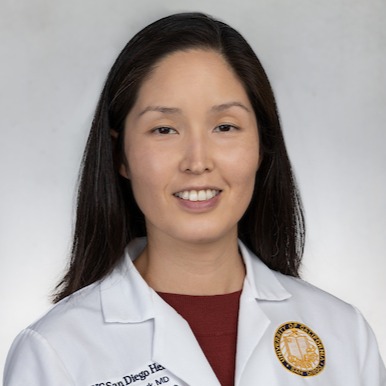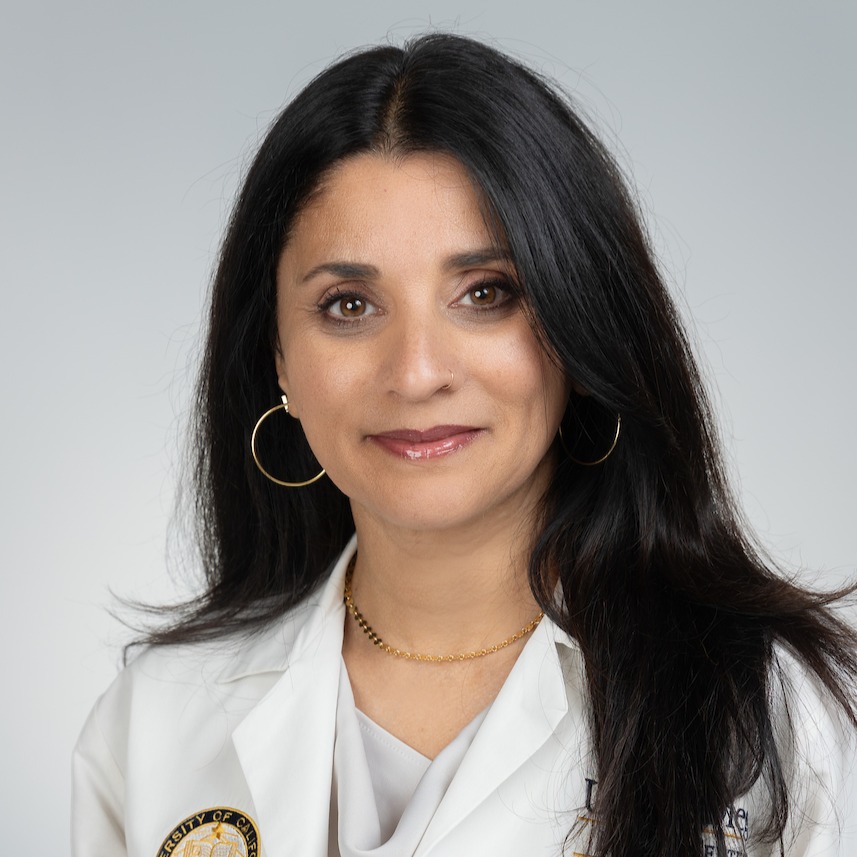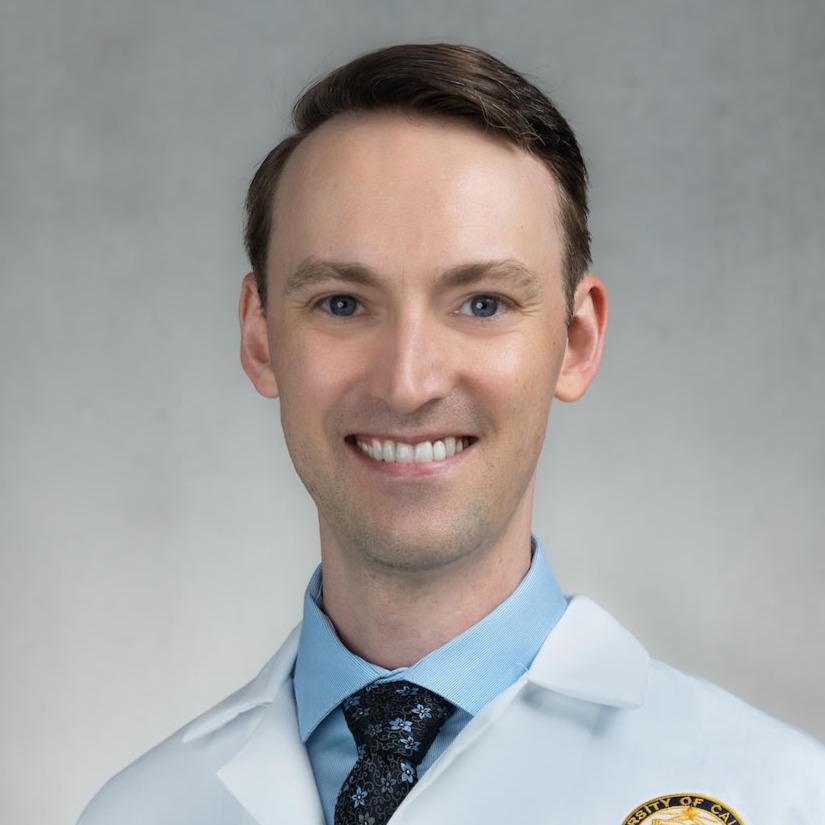
Apheresis Program
UC San Diego Health offers one the nation's largest and most advanced therapeutic apheresis programs.
Led by Amber Sanchez, MD, our expert team works together to guide you through every step of your treatment with precision and care.
What Is Apheresis?
Apheresis is a safe, specialized procedure that carefully separates specific components of your blood – such as plasma, platelets, white blood cells, or stem cells – while returning the rest to circulate in your body. It is used to help manage certain medical conditions and support life-saving therapies.
Why Choose Us?
UC San Diego Health offers several advantages.
The only photopheresis and LDL apheresis in San Diego County
The largest hematopoietic stem cell (HSC) collection facility in the county
A physician on-site during apheresis treatment
The latest state-of-the-art technology
Sickle Cell Patient Improves with Apheresis

Types of Procedures We Offer
Plasma Exchange
Therapeutic plasma exchange (TPE), also known as plasmapheresis, is a nonsurgical therapy that removes and replaces a patient's blood plasma. It is used for many conditions, including myasthenia gravis, multiple sclerosis, chronic inflammatory demyelinating polyradiculoneuropathy (CIDP), certain glomerular diseases of the kidney (such as focal segmental glomerulosclerosis (FSGS) and ANCA-associated vasculitis) and thrombotic thrombocytopenic purpura (TTP).
Photopheresis
Also known as extracorporeal photopheresis (ECP), photopheresis is a nonsurgical therapy that removes, treats and returns a patient's white blood cells. It is used for cutaneous T-cell lymphoma / mycosis fungoides, chronic heart and lung transplant complications, and graft-versus-host disease following stem cell transplantation.
Lipoprotein Apheresis
Lipoprotein apheresis, also known as LDL apheresis, is a non-surgical treatment that removes harmful cholesterol — specifically LDL and lipoprotein(a) — from the blood. It's ideal for patients with familial hypercholesterolemia (FH), elevated Lp(a), peripheral artery disease (PAD), and focal segmental glomerulosclerosis (FSGS). This therapy is especially helpful when medications and lifestyle changes aren't enough. It can significantly reduce cholesterol levels and slow the progression of cardiovascular and kidney disease.
Red Blood Cell Exchange Apheresis
Red blood cell exchange (RBCx) apheresis — also known as therapeutic erythrocytapheresis — is a specialized medical procedure that involves removing abnormal red blood cells, such as those containing hemoglobin S, and replacing them with healthy donor cells. This therapy helps improve oxygen delivery, reduce complications, and manage iron overload more effectively than traditional transfusions. RBCx apheresis is for patients with serious complications of sickle cell disease (SCD), including stroke and chest pain, or certain infections such as malaria or babesiosis.
White Cell Reduction Apheresis
White blood cell reduction apheresis, a form of therapeutic leukapheresis, removes excess white blood cells from the bloodstream. This procedure helps manage conditions such as hyperleukocytosis, leukostasis symptoms, acute leukemias or after chemotherapy.
Platelet Reduction Apheresis
Platelet reduction apheresis — also known as therapeutic thrombocytapheresis or plateletpheresis — is a specialized procedure that removes excess platelets from the blood. This treatment is used when platelet counts become extremely high, which can increase the risk of blood clots or other complications. This can occur in symptomatic thrombocytosis, extremely elevated platelet count, essential thrombocythemia (ET) or polycythemia vera (PV) presenting with acute vascular or thrombotic complications.
Hematopoietic Stem Cell Harvest Apheresis
Hematopoietic stem cell (HSC) harvest apheresis is a special form of leukapheresis used to collect cells from the peripheral blood for use in stem cell transplantation or advanced cellular therapies such as CAR T-Cell and gene therapy. These stem cells serve as the foundation for developing personalized treatments that modify or reprogram a patient's own cells to fight disease or correct genetic disorders.
Getting Started with Apheresis
Make your Appointment
- If you are a new patient or don't have a MyUCSDChart account, call 858-249-3030.
- If you've been referred for an apheresis consultation, we'll contact you with an appointment time and instructions on how to get to the clinic. Please bring your picture ID and all insurance cards.
- If you're an existing patient, log into your MyUCSDChart account to review your health history, renew prescriptions or send a secure message to your provider.
- Feel free to make a list of questions or concerns to discuss with the apheresis physician. We encourage you to bring someone with you for support, as a lot of medical information will be discussed.
What to Expect
Consultation
- At your consultation, the doctor will do a physical exam, including checking arm veins to determine if they're adequate for needle insertion or if a catheter will be necessary.
- The doctor will discuss and explain the procedure, how the equipment works and any possible complications.
- We encourage you to ask questions and clarify any concerns you have.
- If your physician recommends the procedure and you choose to proceed, you will complete the consent forms, obtain insurance authorization, and be scheduled for your apheresis appointment.
- In cases where a dual-lumen central line catheter or implanted port is required, placement will be scheduled before the apheresis appointment.
During the Apheresis Procedure
- You will be connected to an apheresis machine with transparent tubing.
- The average time on the machine is between one and four hours.
- A nurse will be with you at all times.
- Wear loose and comfortable clothing to your procedure so that you can roll up your sleeves or unbutton your shirt for easy access to the arm veins, central line catheter or implanted port.
- Before the procedure begins, your nurse will check your weight, blood pressure, temperature, pulse and respiration rate.
- You will be seated in a reclining chair with blankets and pillows. You may bring your own if you prefer.
- You may choose to read, sleep or watch TV during the procedure. However, some activities may be restricted if peripheral IV access is used in one or both arms.
How You Will Feel
- Most patients feel little to no discomfort while blood is circulated through the apheresis machine.
- You may feel a slight pinch or pressure when the needle is placed in your vein or when a central line catheter or implanted port is accessed.
- You may feel a cooling sensation as blood passes through the machine.
- You may experience some tingling or numbness in the fingers or around the mouth usually due to citrate anticoagulant used to prevent clotting.
- Please notify your nurse immediately if you experience any unusual symptoms or discomfort.
After the Procedure
- Most patients can resume normal activities shortly after the procedure, though some may feel mild fatigue.
- You may have slight bruising, soreness, or tenderness at the needle or catheter site. Keep the area clean and monitor for any unusual swelling or bleeding.
- Your nurse will go over detailed discharge instructions and you will be released from the unit in normal stable condition.
- Contact our apheresis team at 858-249-3030 if you notice persistent bleeding, significant bruising, fever, or unusual symptoms after the procedure. After hours, call the hospital operator at 858-657-7000 and ask for the on-call nephrologist.
Clinical Trials
Clinical trials are highly regulated health-related research studies that move advances in the treatment of diseases and conditions forward into clinical practice. They offer people the chance to receive newly developed therapies and provide crucial information to medical scientists.
We are conducting clinical trials on a broad spectrum of topics related to therapeutic apheresis.








